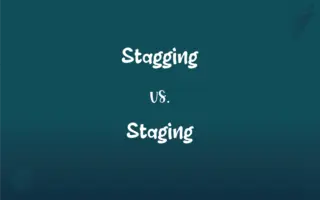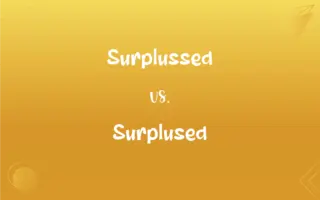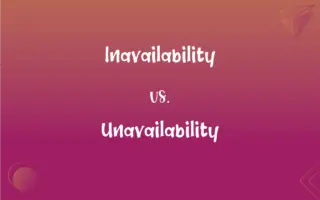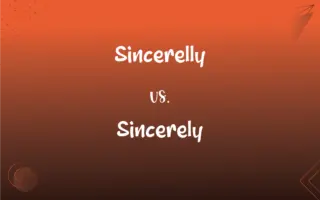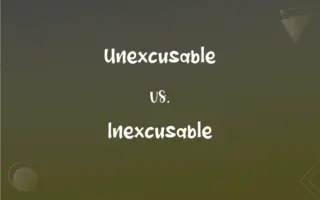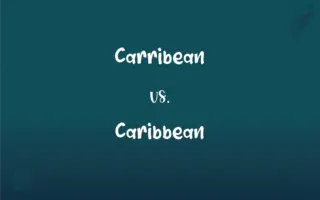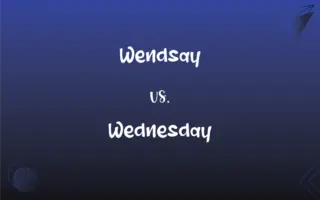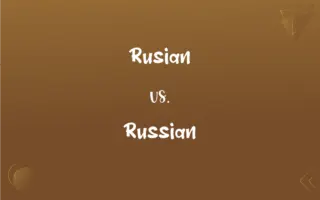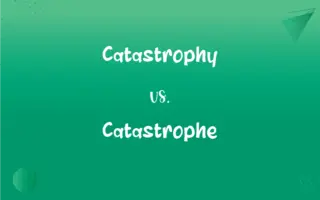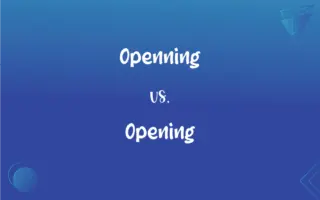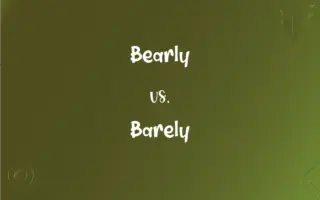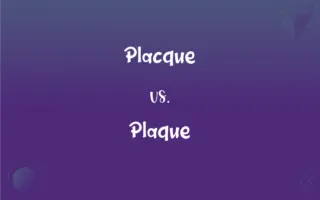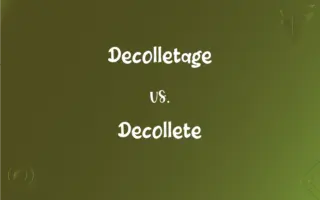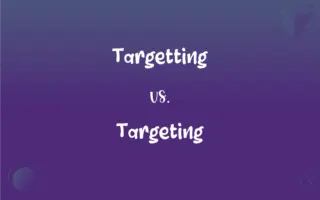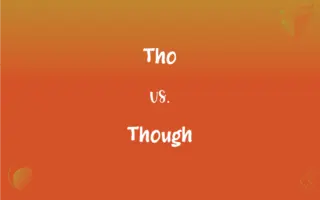Caffiene vs. Caffeine: Mastering the Correct Spelling
Edited by Aimie Carlson || By Janet White || Updated on March 11, 2024
The incorrect spelling is "Caffiene," while the correct spelling is "Caffeine." Caffeine is a stimulant commonly found in coffee and tea.

Which is correct: Caffiene or Caffeine
How to spell Caffeine?

Caffiene is Incorrect

Caffeine is Correct
ADVERTISEMENT
Key Differences
Think of "Caf-Feine" as a hyphenated word to isolate the correct "ei" sequence.
Associate it with the word "coffee," which has two 'f's and two 'e's, much like "caffeine."
Recall the phrase "Cafe Fine" to remember the correct order of 'e' and 'i' in "Caffeine."
Remember that 'i' comes before 'e,' except after 'c,' which is not the case here; 'e' comes before 'i.'
Keep in mind that "caffeine" rhymes with "mean," which has an 'e' before an 'a.'
ADVERTISEMENT
Correct usage of Caffeine
I need my morning caffiene to wake up.
I need my morning caffeine to wake up.
He avoids caffiene after 6 PM.
He avoids caffeine after 6 PM.
They sell caffiene-free soda.
They sell caffeine-free soda.
I read that caffiene can improve focus.
I read that caffeine can improve focus.
She drinks too much caffiene during the day.
She drinks too much caffeine during the day.
Caffeine Definitions
Caffeine is a natural stimulant most commonly found in coffee and tea.
I need caffeine to start my day.
In pharmacology, caffeine is used to treat drowsiness and to improve focus.
Caffeine pills can help with alertness during long drives.
Excessive caffeine intake can lead to jitters and anxiety.
Too much caffeine made her feel jittery.
Caffeine is also an ingredient in various energy drinks and sodas.
Some people prefer the caffeine boost from energy drinks.
Caffeine can have diuretic effects, leading to increased urination.
The caffeine in coffee sometimes acts as a diuretic.
A bitter white alkaloid, C8H10N4O2, found in certain plants such as cacao, coffee, kola, and tea, that stimulates the central nervous system and body metabolism and is used in medicine, usually in combination with other drugs, to relieve headaches and treat respiratory conditions in premature infants.
An alkaloid, C8H10N4O2, found naturally in tea and coffee plants which acts as a mild stimulant on the central nervous system.
A bitter alkaloid found in coffee and tea that is responsible for their stimulating effects
Caffeine Sentences
They discussed the effects of caffeine on sleep quality.
He noticed improved endurance after consuming caffeine before his run.
My doctor advised me to reduce my caffeine intake.
Caffeine helps me stay alert during long meetings.
She feels a headache if she doesn't get her morning caffeine.
I switch to caffeine-free tea in the evenings.
She limits her caffeine intake to avoid jitters.
My favorite source of caffeine is a strong cup of black coffee.
They found that caffeine can sometimes reduce the risk of certain diseases.
He researched natural sources of caffeine for his diet.
They offer caffeine-free options at the coffee shop.
They warned about the dangers of excessive caffeine consumption.
They make a special blend of low-caffeine coffee.
I learned that caffeine is naturally found in over 60 plants.
She tracks her caffeine consumption with an app.
My morning routine includes a caffeine boost from green tea.
She avoids caffeine to keep her anxiety in check.
He uses caffeine strategically to enhance his workout performance.
I enjoy the social aspect of coffee breaks as much as the caffeine.
She uses caffeine to help her through late-night study sessions.
He enjoys the taste of coffee, not just the caffeine.
They educate athletes on the pros and cons of caffeine use.
She prefers her caffeine in the form of chocolate.
He was surprised to learn that some pain relievers contain caffeine.
He loves exploring different coffee cultures and their caffeine rituals.
Caffeine Idioms & Phrases
Cutting back on caffeine
Reducing the amount of caffeine consumed in an effort to improve health or sleep.
He's cutting back on caffeine to try and sleep better at night.
Caffeine-free
Products that do not contain caffeine.
He switched to caffeine-free soda to avoid drinking caffeine late in the day.
Caffeine rush
A sudden burst of energy after consuming caffeine.
The caffeine rush from his morning latte hit him quickly.
Caffeine overload
Consuming an excessive amount of caffeine, leading to negative side effects.
She felt nauseous after a caffeine overload from too many energy drinks.
Caffeine withdrawal
Symptoms experienced when a regular caffeine consumer suddenly stops or reduces intake.
She had a headache from caffeine withdrawal after skipping her daily coffee.
Caffeine buzz
The feeling of increased energy and alertness from consuming caffeine.
After her second espresso, she felt the caffeine buzz kick in.
Caffeine tolerance
The reduced effect of caffeine as a result of regular consumption.
His caffeine tolerance was so high that one coffee didn't wake him up anymore.
Caffeine cycle
The routine of consuming caffeine at regular intervals throughout the day.
He was stuck in a caffeine cycle, needing coffee every few hours to stay awake.
Caffeine boost
An increase in energy and alertness from consuming caffeine.
She took a short break for a caffeine boost before the meeting.
Caffeine dependency
A condition where the body becomes dependent on caffeine to function normally.
She's trying to break her caffeine dependency by gradually drinking less coffee.
Caffeine content
The amount of caffeine present in a food or drink.
The caffeine content in energy drinks can be surprisingly high.
Caffeine crash
The sudden drop in energy levels after the effects of caffeine wear off.
He experienced a caffeine crash in the afternoon after skipping lunch.
Kick the caffeine habit
To stop or greatly reduce caffeine consumption.
She decided to kick the caffeine habit for her New Year's resolution.
Caffeine habit
The routine of regularly consuming caffeine.
Her caffeine habit included a coffee in the morning and a green tea in the afternoon.
On a caffeine high
Experiencing the heightened effects of caffeine, such as increased alertness and energy.
She was on a caffeine high and couldn't stop talking.
Caffeine kick
The initial feeling of alertness and energy after consuming caffeine.
He relies on the caffeine kick from his morning espresso to start his day.
Sensitive to caffeine
Experiencing strong effects from a small amount of caffeine.
He's sensitive to caffeine, so even a small cup of coffee affects him.
FAQs
What is the pronunciation of Caffeine?
It is pronounced as "KAF-een."
Which vowel is used before Caffeine?
The vowel "e" is used before Caffeine.
Why is it called Caffeine?
The term originates from the German word "Kaffein," a compound word from "Kaffee" meaning coffee.
What is the verb form of Caffeine?
There is no standard verb form of "caffeine."
What is the root word of Caffeine?
The root word is "Caf-" derived from the word "coffee."
Which preposition is used with Caffeine?
Prepositions like "of," "in," and "with" can be used with Caffeine.
Which conjunction is used with Caffeine?
The conjunction "and" is commonly used with Caffeine.
Is Caffeine a noun or adjective?
"Caffeine" is primarily a noun.
Is Caffeine a negative or positive word?
It is a neutral word.
What is the singular form of Caffeine?
The singular form is "Caffeine."
Is Caffeine an adverb?
No, it is not an adverb.
Is Caffeine an abstract noun?
No, it's a concrete noun as it can be physically isolated.
Is Caffeine a collective noun?
No, it is not a collective noun.
What is the plural form of Caffeine?
There is no standard plural form as it's a non-countable noun.
How many syllables are in Caffeine?
There are 3 syllables in "Caffeine."
What is the opposite of Caffeine?
The opposite could be a "sedative" or "depressant."
What is the first form of Caffeine?
The first form is "Caffeine."
Is Caffeine a countable noun?
No, it is generally considered an uncountable noun.
Is the word Caffeine imperative?
No, it is not imperative.
What is a stressed syllable in Caffeine?
The stressed syllable is "Caf."
Which determiner is used with Caffeine?
Determiners like "some," "the," and "any" can be used with Caffeine.
Is Caffeine a vowel or consonant?
"Caffeine" starts with a consonant.
How do we divide Caffeine into syllables?
It can be divided as "Caf-feine."
How is Caffeine used in a sentence?
Example: Consuming too much caffeine late in the day can interfere with your sleep.
Is the Caffeine term a metaphor?
No, it is not a metaphor in its standard usage.
What is another term for Caffeine?
Another term could be "stimulant."
What is the second form of Caffeine?
There is no second form as it is primarily a noun.
Which article is used with Caffeine?
The articles "a" and "the" can be used, depending on the context.
What part of speech is Caffeine?
It is a noun.
What is the third form of Caffeine?
There is no third form as it is primarily a noun.
About Author
Written by
Janet WhiteJanet White has been an esteemed writer and blogger for Difference Wiki. Holding a Master's degree in Science and Medical Journalism from the prestigious Boston University, she has consistently demonstrated her expertise and passion for her field. When she's not immersed in her work, Janet relishes her time exercising, delving into a good book, and cherishing moments with friends and family.
Edited by
Aimie CarlsonAimie Carlson, holding a master's degree in English literature, is a fervent English language enthusiast. She lends her writing talents to Difference Wiki, a prominent website that specializes in comparisons, offering readers insightful analyses that both captivate and inform.


